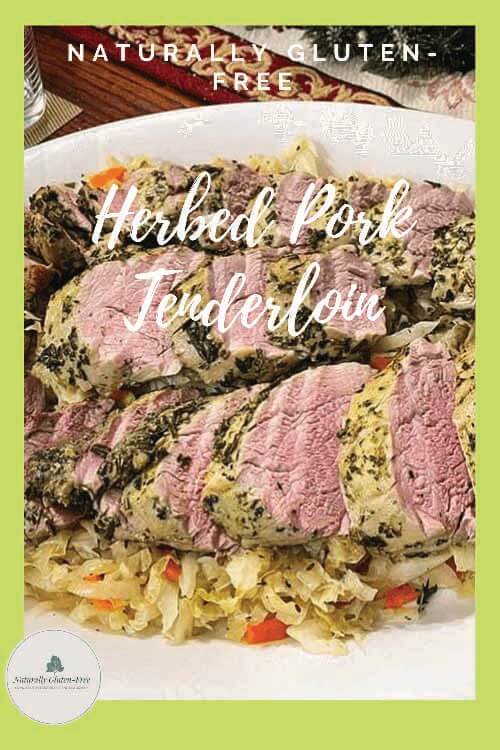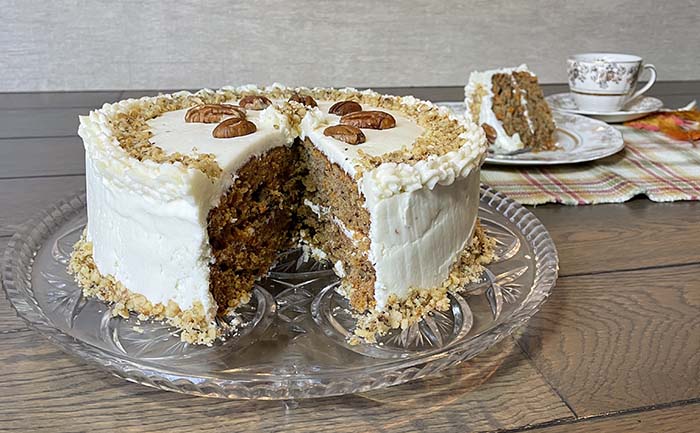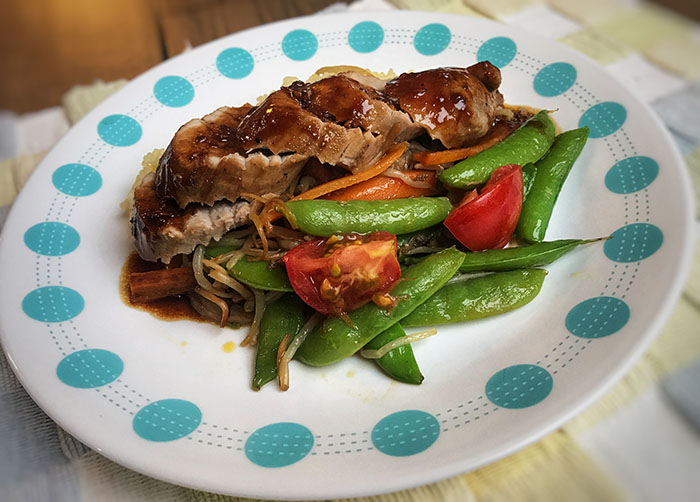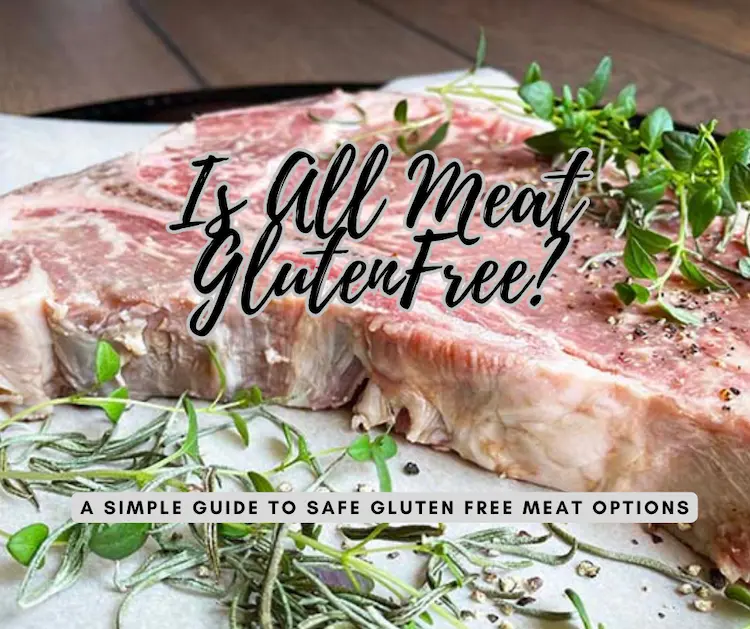Herbed Pork Tenderloin
This amazing herbed pork tenderloin is a special occasion recipe you'll be proud to serve. There are a few steps, a little extra prep, but it's really not that hard and it is so worth it!
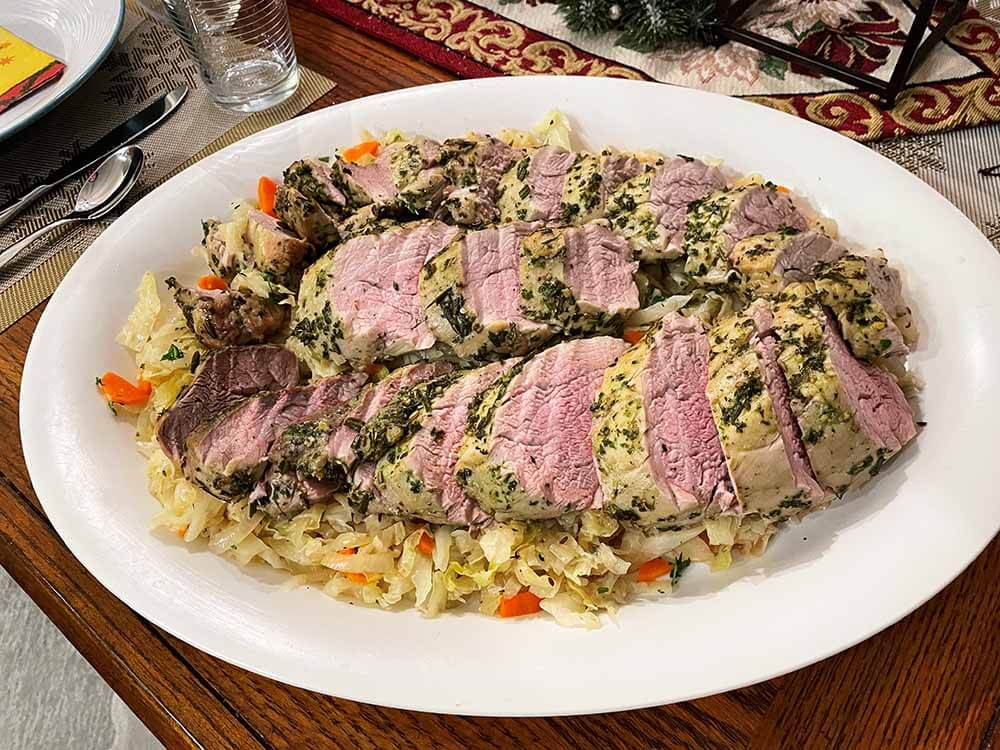
This incredible herbed port tenderloin owes it's succulent moistness to two things. 1. the brining and 2. close attention to cooking temperature. Over-cook your pork tenderloin and you'll have chewy shoe leather for dinner.
Skip right to the recipe if you like or keep reading for some valuable background info.
About Pork Tenderloin
Is Pork Tenderloin Gluten-Free
All fresh whole cuts of meat are naturally gluten-free, it's how we season and cook our meat that makes the difference. If you are buying a pre-seasoned pork tenderloin at the butcher or grocery store make sure you know what ingredients are used in the seasoning and if they are gluten-free. Pork tenderloin can be breaded or floured, or soy sauce can be used in marinades or seasoning so you want to be sure to steer clear of all that.
If you order pork tenderloin in a restaurant or if it's served at a friends house, you need to ask all the usual questions about ingredients, how it's cooked, how is cross contamination managed. For tips on restaurant dining go here, and for tips on throwing and attending dinner parties go here.
Is Pork Tenderloin Healthy?
Of course "healthy" means different things to different people, but if you are looking for lean protein, then yes. Pork tenderloin is one of the leanest cuts available with 3.5 grams of fat per 100 grams of meat. This is similar to a chicken breast1.
Can I Eat Pork If It's Pink?
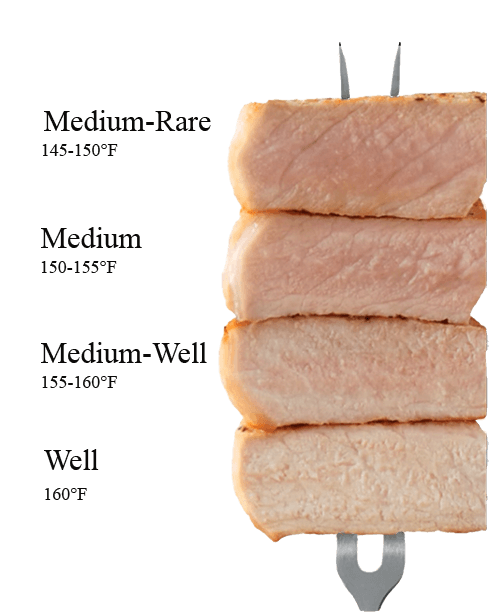
The concern with pork is a disease called trichinosis which comes from a parasite that can be found in game meat and in the past was common in pork.
Since the 1950's trichinosis from pork has been very rare, so it is unlikely you'll become sick from rare pork. However, if you're uncomfortable with pink pork, I completely understand and won't be the least bit upset of you cook it a little longer.
Just be sure to use a thermometer to test for doneness so you don't overdo it and make it dry and tough.
Brining Meat
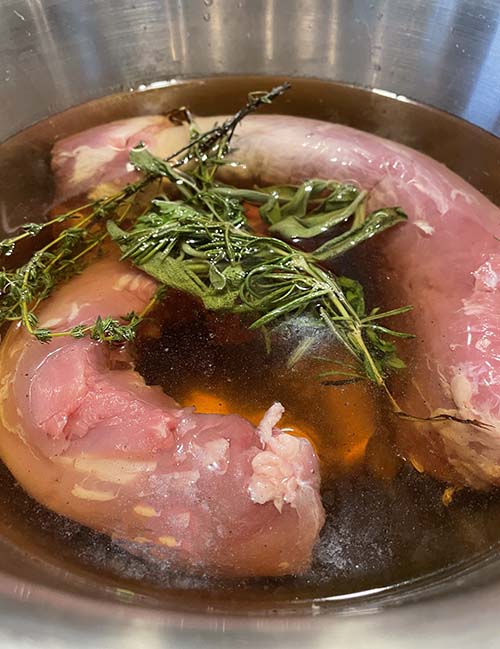
If you've tried my Maple Curry Brined Chicken Breast, then you're already familiar with the concept of brining. The idea is to soak the meat in salt water to make it absorb and hold moisture. "But doesn't salt make meat dry?" you're asking. At first yes, but if you leave it for a bit the process reverses. First, the salt water draws the juices out of the meat, but then the meat draws the brining liquid back into it's fibers. You can also flavor your brining liquid to make your meat even more delicious. This recipe has some garlic and herbs along with some honey for sweetness. I use this method for most very lean cuts of meat like a boneless chicken breast or loin chops because they don't have a lot of fat to provide moisture and tenderness.
The Prep
There is a bit of prep for this herbed pork tenderloin recipe, but once you have the brine and the herb paste made, it's actually quite simple. Soak, pat dry, smush with herb paste, roast for 30 min. Yes it's that quick.
Preparing Your PanI recommend doing this on a rimmed baking sheet, lined with parchment and fitted with a rack. The parchment will make clean up easy and the rack keep your herbed pork tenderloin raised up so the hot air can circulate and it cooks evenly. Making the BrineAny of the ingredients here are optional except the salt and sugar, or you can substitute however you like. I do recommend adding the herbs though because they really do enhance the flavor. |
Pin For Later |
The process is simple, no chopping and you can put the herbs in whole or tear them up a bit if they fit better. Bring the mixture to a boil, turn it off. Cool it to room temperature with the addition of cool water and soak your meat. Easy peasy.
Making the Herb Paste
This is pretty simple too. You're going to mix it all in the blender or food processor so you don't need to to any chopping here either. You do need to pick the leaves off the rosemary and thyme because the stems can be quite woody. Pick the leaves off the parsley or throw in the stems, up to you. Anyway, just toss all the ingredients in the blender or food processor and whiz them up until you have a course paste. You may need to stop and push the mixture down toward the blade a couple of times (always turn off the blender). Start with just 2 tbsp. of olive oil and then add a bit more if needed.
Preparing and Roasting Your Herbed Pork Tenderloin
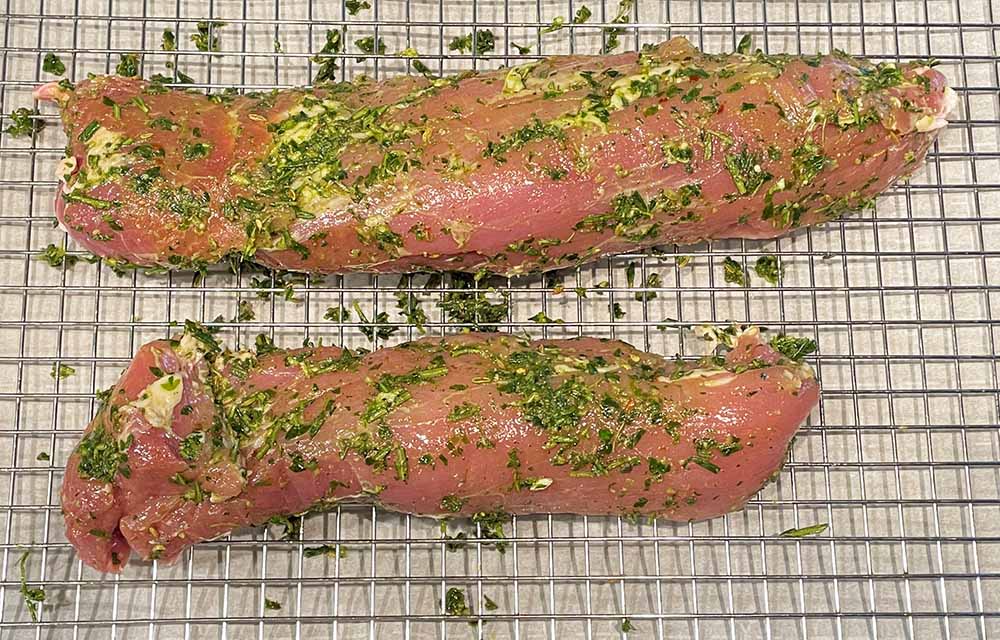
Simply rub the herb paste all over the pork tenderloin. Don't be afraid to get your hands dirty and smoosh it all over. Then lay it on a rack over a parchment lined baking tray and pop it into your pre-heated oven.
This cooks really quickly. Just 30 min for medium-rare or a few minutes longer if you want it more well done. Keep an eye though and use your thermometer. You don't want to over cook and dry it out. Well done is 160° so you could take it out a bit before, say anywhere over 156°. You're going to let it rest and the temperature will come up a couple of degrees.
Resting Your Meat
Any meat that you cook using a dry heat method, that is grilling or roasting as opposed to moist heat cooking which includes boiling or braising, benefits from a resting period. Without resting, cutting into the meat will cause much of those precious juices to escape and leave your beautiful cut of meat that you've prepared and cooked to perfection dried out and tough. What resting does is it gives the muscle fibers in the meat time to relax and absorb the juices back into them. Also, the meat continues to cook a bit so the internal temperature will come up a little. As a general rule, 5 to 10 minutes for smaller pieces of meat like steak or pork tenderloin, 15 to 20 minutes for a roast.
Slicing and Serving Your Herbed Pork Tenderloin
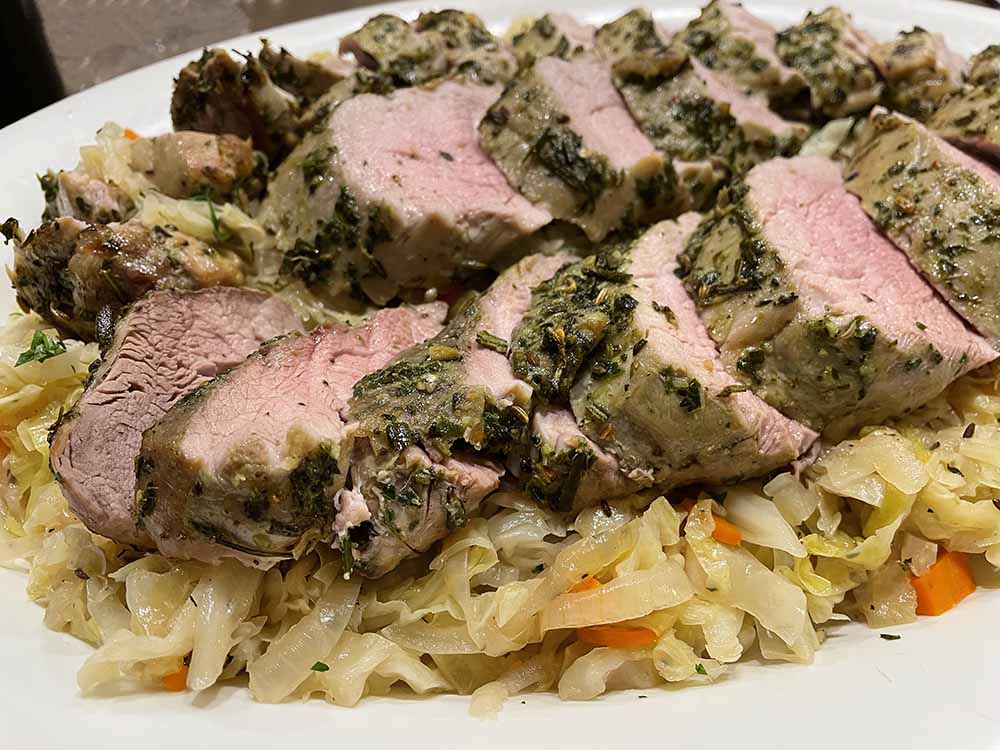
Your herbed pork tenderloin should be served as medallions. This means sliced across the grain so that you have little circles of succulent roast. Not too thin, not too thick. Say about 1/2" to 3/4" inch thick. The photo shows our herbed pork tenderloins served with a warm cabbage salad. You can also provide applesauce, or a sweet and savory sauce like a pineapple curry relish, or a mango hot chili sauce or your favorite chutney.
The Recipe
Ingredients
Brine
|
1/4 cup kosher salt 1/4 cup of honey or maple syrup or brown sugar. * 3 cloves of garlic, peeled and smashed 2 sprigs of rosemary 2 sprigs of sage 1 sprig of thyme 1 sprig of parsley 2 pork tenderloins enough water to cover - about 6 or 7 cups |
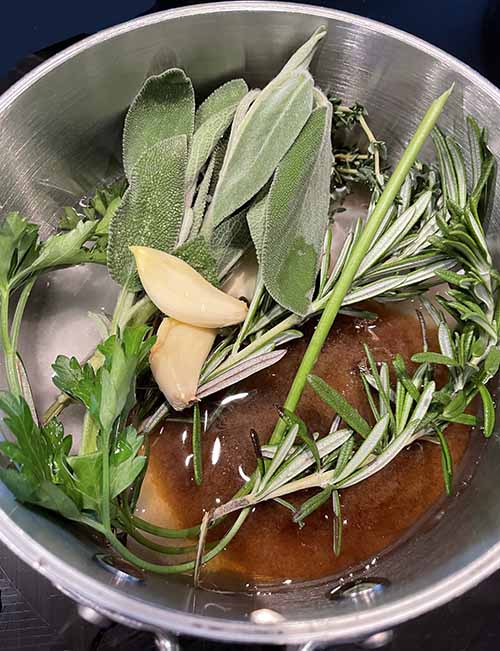 |
For a keto friendly version leave this out or substitute a keto approved sweetener like erythritol. I recommend keeping these sweeteners to a minimum in your diet as they are highly processed and can cause stomach upset.
Herb Paste
|
2 sprigs of sage 2 tbsp of fresh rosemary leaves 1 tbsp fresh thyme leaves 10 pieces of parsley, leaves picked 2 cloves of garlic, peeled 1 tsp fennel seeds 1/2 chili flakes 2-3 tbsp extra virgin olive oil |
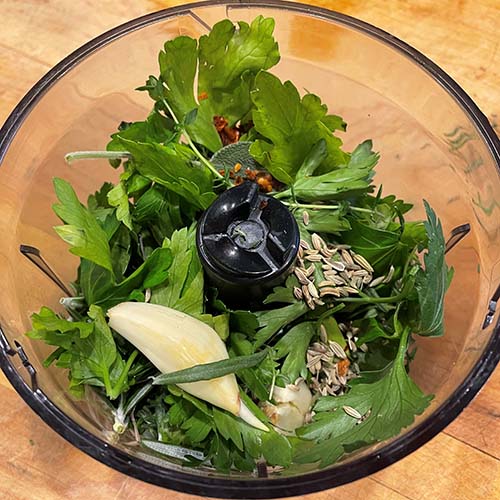 |
Method
Brine
Preheat oven to 400°F
Place all the herbs along with the salt and sugar and one cup of water into a medium sized sauce pan (one big enough to hold both tenderloins but don't put them in yet).
Bring the mixture to a boil and turn off the heat.
Cool it down to room temperature by adding about 6 cups of cool water.
Add the tenderloins to the mixture and let soak for 30 to 45 min.
Herbed Paste
|
Place all the ingredients with 2 tbsp of extra virgin olive oil into a blender or food processor and blend until you have a coarse paste. Scrape down the sides and add a little more olive oil if necessary. Rub the mixture all over the the tenderloins, place on the pan and bake until the desired temperature is reached (see the chart above). About 30 min for medium rare. |
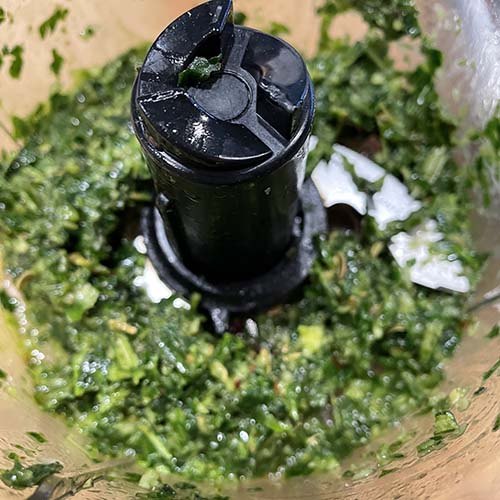 |
You Might Also Like
Gluten-Free Carrot Cake: This really is the best gluten-free cake recipe I've ever made! I know that's a lofty claim, but give it a try and I think you'll agree.
Maple Glazed Pork Tenderloin: This sweet succulent tenderloin recipe uses maple sugar for the sweetness and a bit of Dijon mustard for a slightly spicy kick.
Home>Recipes>Herbed Pork Tenderloin



